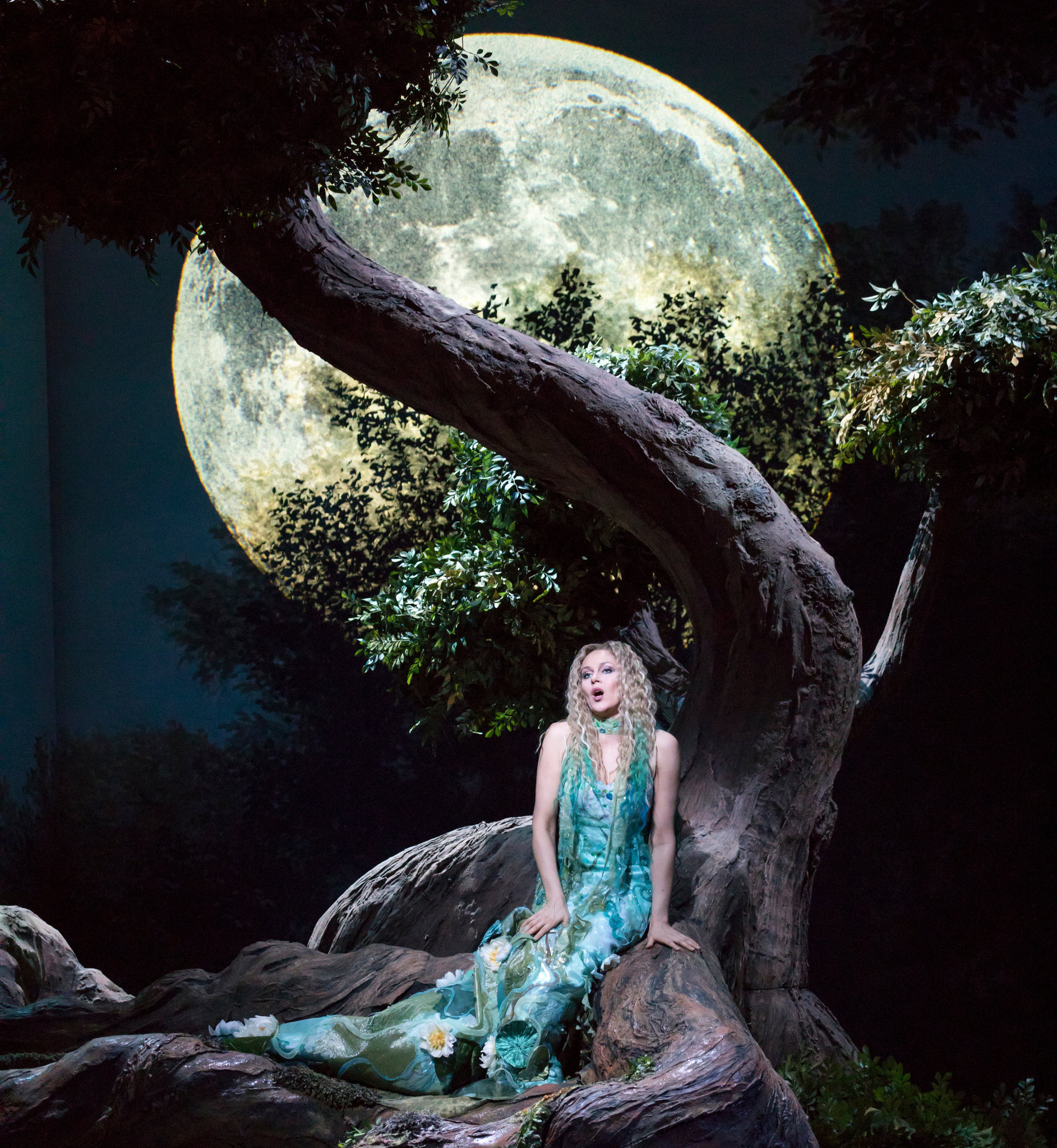
Kristine Opalais in "Rusalka" by Dvorak.
Saturdee Opry Links Overture
"Rusalka," by Dvorak
https://www.youtube.com/watch?v=RGp79cWFlOg
1.
Here is "Jenufa's Prayer," from the Czech tragedy,
"Jenufa," by Janacek. Renee Fleming, with English captions.
Summary: Janacek's Jenufa revolves around one
of the worst crimes portrayed in any opera, the drowning of a newborn
infant in an icy river. It's an act
driven by narrowmindedness and cowardice — but also by love. And
remarkably, the overall theme of the opera is forgiveness. When the
title character's child is murdered by her own stepmother, Jenufa reacts
not with calls for vengeance, but with tender absolution — set to some
of Janacek's most radiant music.
https://www.youtube.com/watch?v=qlkdwWauT-0
About:
http://www.npr.org/2007/10/05/14992132/leos-janaceks-jenufa
2.
Another glorious Czech aria that has so much in common with Puccini that
I strongly suspect the composer, Dvorak, took his cue from Puccini's
magical, transporting melodies. The mysterious and lovely "Song to the Moon," from
"Rusalka." Here in a beautifully staged production, with soprano
Kristine Opalais.
https://www.youtube.com/watch?v=hzgQPjbDTMM
And a more complete clip with Renee Fleming:
https://www.youtube.com/watch?v=YXHbSBwOXiI
Translation:
http://www.aria-database.com/translations/rusalka01_moon.txt
Summary: A
meadow by a lake, in fairy-tale times. The water nymph Rusalka sits
sadly by the water as wood nymphs sing and dance. When the water gnome
Vodník asks why she is unhappy she tells him that she has fallen in love
with a human—the prince—when he came to swim in the lake. Now she wants
to become human herself and live on land to be with him. Horrified,
Vodník tells her that humans are evil and full of sin. When Rusalka
insists, claiming they are full of love, he says she will have to get
help from the witch Jezibaba, then sinks back into the lake in despair.
Rusalka calls on the moon to tell the prince of her love (“Mesícku na
nebi hlubokém”).
http://www.metoperafamily.org/metopera/season/synopsis/rusalka
3.
Czech this out. From Smetana's "Hubicka" ("The Kiss"), here is
"Vendulka's Lullabye." Poor Smetana went deaf, yet still managed to
write this! The soprano is Milada Šubrtová.
EXCERPT: in 1876, he was given a new libretto,
called Hubička, or The Kiss. It tells an awkward
story of rekindled romance — some might
even call it silly. But Smetana, who was dealing with a new and surely
frightening time in his life, took the libretto's tale of renewed love —
and hope — to heart. In the process, he created an opera with a
touching, folk-like charm, and a depth of feeling that somehow goes
beyond its outwardly simple story.
Synopsis: Left alone and confused after
Lukas storms out of the house in Act One, Vendulka (soprano Pumeza
Matshikiza) sings a thoughtful lullaby to Lukas's young child.
http://www.youtube.com/watch?v=mcS31n6OR2o
About the soprano:
https://en.wikipedia.org/wiki/Milada_%C5%A0ubrtov%C3%A1
Renee Fleming talks about the aria:
http://www.youtube.com/watch?v=l0J55ypcePQ
4.
Yet another lovely Czech soprano aria, this one from "Libuse," by poor,
deafened
Smetana. Apparently this is the most loved opera in the culture. Regret that am
unable to find translation. Easy to hear the Wagner "Ring" influence.
The soprano is Gabriela Beňačková.
http://www.youtube.com/watch?v=kCI8s8bXhh8
About:http://en.wikipedia.org/wiki/Libuše_%28opera%29
Not performed in the USA until 1986:
http://www.nytimes.com/1986/03/15/arts/opera-us-premiere-of-smetana-s-libuse.html
About the soprano:
https://en.wikipedia.org/wiki/Gabriela_Be%C5%88a%C4%8Dkov%C3%A1
5.
There are many Russian arias on Youtube, but not too many translations
available, sorry to say. Here is one from
Tchaikovsky's "Queen of Spades." This is "Ya vas Lyublyu." And by god,
there is a translation! The baritone is the great Pavel Lisitsian.
http://www.youtube.com/watch?v=ipf1ufoE7wg&list=RDipf1ufoE7wg
Translation:
http://www.opera-arias.com/tchaikovsky/the-queen-of-spades/ja-vas-lyublyu/
Synopsis: ACT I. During the reign of
Catherine the Great (1762-96), children are at play in a St. Petersburg
summer park. Two soldiers — Tsurin and Chekalinsky — enter, the former
complaining about his bad luck at gambling. They remark that another
soldier, Gherman, seems obsessed with the gaming table but never bets,
since he is frugal and methodical. Gherman appears with Tomsky, who says
his friend hardly seems like his old self: is anything bothering him?
Gherman admits he is in love with a girl above his station, whose name
he does not even know.
About Pavel Lisitsian:
https://en.wikipedia.org/wiki/Pavel_Lisitsian
6.
Seeing as it's too time-consuming (for me) to look up Russian arias,
here's the next best thing: a Russian singing an Italian aria---well, in
this case, a classic Neopolitan song. "Core 'ngrato" ("Ungrateful Heart.")
Continuing with the great baritone,
Pavel Lisitsian.
http://www.youtube.com/watch?v=RpFTK0q6kfA
About Lisitsian:
https://www.operamusica.com/artist/pavel-lisitsian/
Translation:
http://www.recmusic.org/lieder/get_text.html?TextId=4018
About the song:
http://en.wikipedia.org/wiki/Core_%27ngrato
7.
More Pavel doing Italian! I can't resist his mellifluent tones. Here he
is with "Il Balen" from Verdi's "Il
Trovatore." Somehow sounds a little Russian, anyway, doesn't it? Wait a
second. I know why it sounds a little Russian---he’s singing in Russian.
(Duh.)
http://www.youtube.com/watch?v=WQZ0FGPGfJU
About, translation:
http://www.aria-database.com/search.php?individualAria=511
Compare and contrast:
http://www.youtube.com/watch?v=jGGlzb0baYE
8.
"Song of the Flea," by Modest Mussorgsky. The great Paul Robeson
sings Mussorgksy's whimsical Russian tune.
http://www.youtube.com/watch?v=sI4xXmWoaJk
Translation:
http://www.conservapedia.com/Mussorgsky
9.
And for the penultimate Opry Link, we turn to Tchaikovsky again, and
Anna Netrebko. This is the "letter scene" from "Eugene Onegin," also
known as "Puskai pogibnu ya," if you're keeping score at home.
Characteristic Tchaikovsky welling is unmistakable. With English
subtitles!
https://www.youtube.com/watch?v=d56MMagyMXs
About this scene:
https://thelistenersclub.com/2016/06/20/the-letter-scene-from-eugene-onegin/
FINAL BOW:
The great baritone, Feodor Chalipin, tenderly sings Massenet's deeply
sad, "Elegie." "O sweet Spring of yesteryear, green seasons, you have
fled forever!" In Russian, for that extra dimension of despair!
https://www.youtube.com/watch?v=jiMzANUDnro
Translation:
https://www.oxfordlieder.co.uk/song/3356



